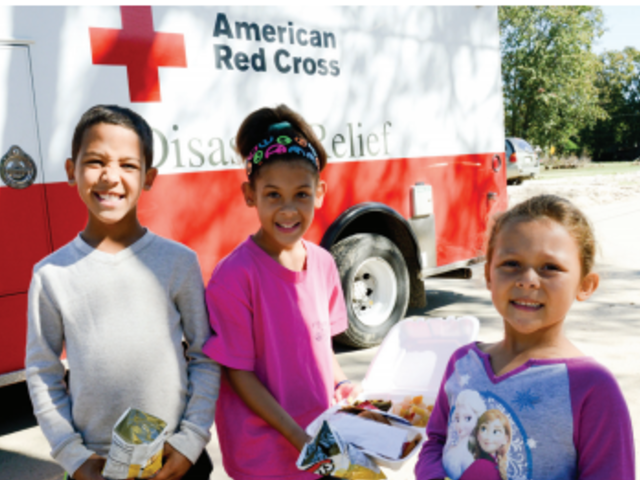Although national media has moved on to other stories, thousands of people in the Southeastern United States continue to deal with the effects of Hurricane Matthew. The American Red Cross is on the ground, working with individuals and families in need by providing food, shelter and help on the road to recovery. The Red Cross and our partners have already served more than 1.3 million meals and snacks and provided 99,000 overnight stays, and our massive response is far from over. Red Cross workers and volunteers will remain within the hardest-hit areas to support those affected for as long as help is needed.
Floodwaters are still receding, and as conditions permit, Red Cross disaster teams are circulating through deluged areas in Emergency Response Vehicles (ERVs), delivering food and relief supplies to people cleaning and mucking out their homes. On Sunday, more than two weeks after Hurricane Matthew made landfall in the United States, over 600 people in North Carolina, South Carolina, Florida and Georgia sought refuge in 17 Red Cross and community shelters. More than two-thirds of this shelter population was stationed in North Carolina.
To date the Red Cross and our partners have:
· Provided more than 99,000 overnight stays in 621 shelters and evacuation centers;
· Served more than 1.3 million meals and snacks;
· Distributed nearly 285,000 relief items, including cots, blankets, kitchen items, cleaning supplies and comfort kits; and
· Made more than 26,000 disaster health and mental health contacts for individuals and families in need.
At this point in our response effort, the Red Cross is providing casework to impacted residents. This means talking with people individually and providing them an opportunity to share their needs with a trained caseworker who coordinates follow-up services, and—for those who qualify—provides financial assistance. Recovering from a disaster can be a confusing, emotionally draining and complicated process. Red Cross caseworkers are trained to help people create recovery plans and locate help from other agencies. Each community and each family will have different needs, and will require different support to meet those needs.
In the United States alone, the response to Hurricane Matthew is anticipated to cost between approximately $24 – $28 million. At present, we have raised only $8.1 million in designated donations and pledges for Hurricane Matthew—so we need the public’s support to help the thousands of people still suffering.
· This cost range represents our best estimate at this time and may change upwards or downwards as the situation continues to evolve and more information becomes available. It includes the costs of providing food, shelter, blankets, cots, emotional support, health services, relief supplies and initial casework support.
· It also includes some of the costs that make relief possible including logistics, staff and technology expenses to support such a significant disaster. An average of 91 cents of every dollar the Red Cross spends is invested in humanitarian services and programs, including disaster relief and recovery.
Accounts from the Ground:
At 40 weeks pregnant, Yanci Flores fled from her home in North Carolina with her family when Hurricane Matthew’s devastating flooding inundated her community. For two weeks, Yanci, her husband and their five children stayed in a Red Cross-supported shelter in North Carolina before Yanci went into labor and headed to the hospital. Late last week, the Flores family welcomed Jacob into the world, a beautiful and healthy baby boy. Both Yanci and Jacob are doing well, despite the added stress of staying in an emergency shelter at the very end of pregnancy.
“The Red Cross workers have all been very good,” Yanci says of the shelter staff. “Especially Nolan.” Nolan is a Red Cross nurse that had been working in the shelter and caring for Yanci. He was able to track down a medical cot for her so that she would be more comfortable in the shelter until she gave birth.
“Yanci’s biggest worry right now is where they will go once they are discharged from the hospital,” explains Rod Cook, a Red Cross leader who has been closely working with the Flores family. Rod and his team put together a gift basket for Yanci and Jacob, with donations from the community including, diapers, baby wipes, nursing pads and other essentials. “We want to make sure they are as comfortable as they can be, and have everything they need,” says Rod.
When Rod delivered it to Yanci her face lit up and tears welled in her eyes. “Gracias,” she said to Rod. The gift basket was a welcomed surprise. With all of their preparation for Jacob’s arrival, they were worried about how they would get newborn essentials. Red Cross caseworkers are working with community partners to figure out a long-term housing solution for the family and their new bundle of joy.

